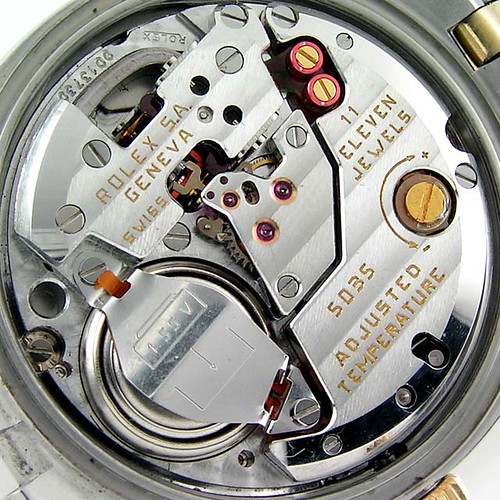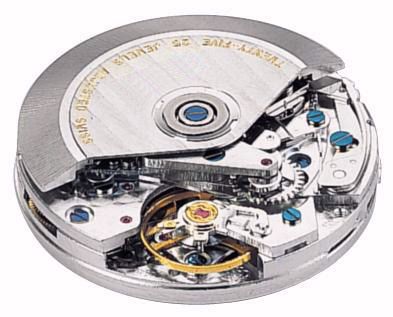
 |
ROLEXROLEXROLEXROLEXROLEXROLEX
 ROLEXROLEXROLEXROLEXROLEXROLEX
ROLEXROLEXROLEXROLEXROLEXROLEX
|
|
#1 |
|
Banned
Join Date: May 2009
Real Name: magneeleVE
Location: Usa
Watch: magneeleVE
Posts: 2,030
|
Quartz vs. Mechanical
The first thing to know about watches is that all of them -- fancy or plain, expensive or cheap -- fall into one of two categories: quartz or mechanical.
There are two major differences between them. A quartz watch uses as its regulator-the device responsible for keeping time-a tiny tuning-fork-shaped piece of quartz (which is how quartz watches got their name). A mechanical watch uses as its regulator a tiny wheel called a balance wheel and a spring called a balance spring or hairspring. A quartz watch is powered by electricity. A mechanical watch is powered by a mainspring. Quartz watches are by their very nature more accurate than mechanical ones. That's because a quartz crystal is a better regulator than a balance wheel. Quartz crystals and mechanical balance wheels both measure time in the same way - by oscillating, or vibrating, at a constant rate. A quartz crystal oscillates faster (32,768 times a "second") than a balance wheel (28,800 times an "hour" in most mechanical watches). The oscillations of quartz movements aren't just faster, they're also steadier. Both factors contribute to quartz's superiority as a timekeeper. The result: A high-quality mechanical movement will gain or lose perhaps five or 10 minutes a month. On the other hand, an average-quality quartz watch will gain or lose no more than 10 seconds a month, which in mechanical movement standards, will quality for the movement for the Poincon de Geneve Certification Seal, the highest quality standard a Geneva watch manufacture could receive. Generally speaking only movements ranging in the highest standard section the Grand Complication Turbulon category receive the honor bestow. Incidentally, one quick way to tell a quartz watch from a mechanical one is to observe the seconds hand at it turns. If it moves in one-second jumps, the watch is quartz. If it moves smoothly, it's mechanical. So why quartz watches cost cheaper than mechanical watches? Production Volume! In 1960s, the Japanese watch & clock manufacturer, Seiko, first invented the quartz movement. Its accuracy and practice soon phase out almost the entire watchmaking industry of Switzerland. Besides that, technology revolution in manufacturing industry soon makes manufacturing quartz movement much easier and cheaper in cost than manufacturing mechanical movements. Nowadays, the cost of a mid-level quality quartz movement is only about $1 or $2 because the manufacturing process is automated and no more craftsmanship is involved. However, to manufacture mechanical watches can never be automated because watchmaker's attention while assembling total of 140 ~ 250 different metal parts into a complete watch movement is still the key in making a mechanical watch. It's still impossible to mass production fine mechanical movements. This is where the value of a fine Swiss mechanical watch lays, soul of craftsmanship. Quartz   Mechanical  Automatic 
|
|
|

|
| Currently Active Users Viewing This Thread: 1 (0 members and 1 guests) | |
|
|
*Banners
Of The Month*
This space is provided to horological resources.